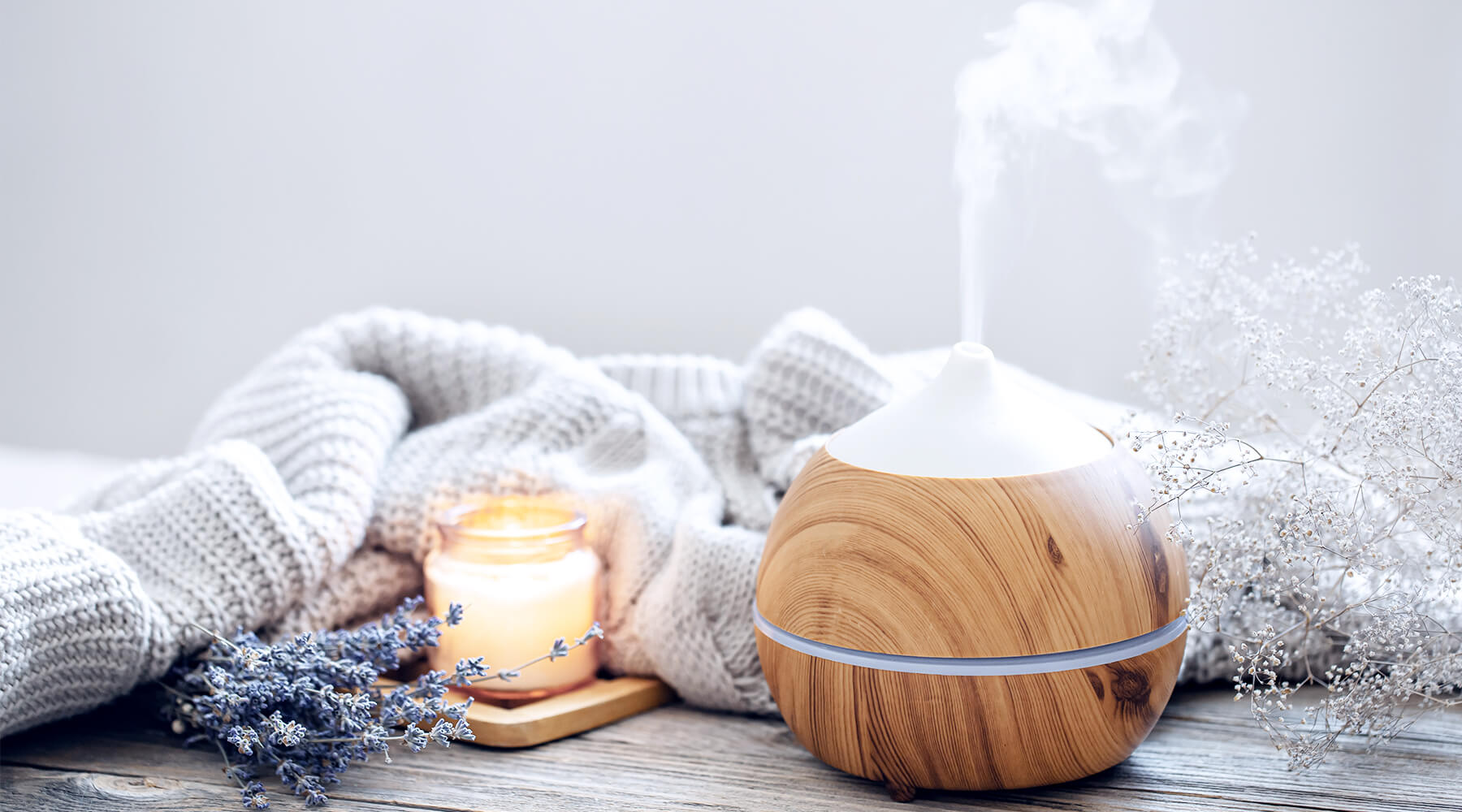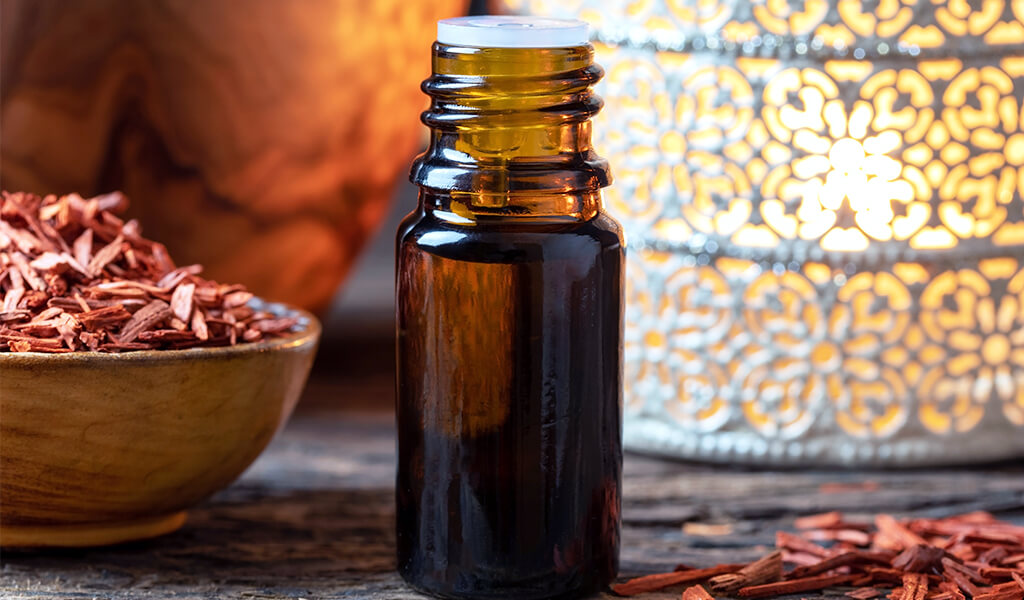
Fragrance & sleep
Aromatherapy and scent therapy are considered an effective method for combating stress, lack of relaxation, and sleep disorders. Learn how certain scents influence our sleep and which aromas can help us sleep more restfully here.
Table of contents
- Stress, relaxation & sleep
- Our sense of smell & scents while we sleep
- Aromatherapy: Essential oils for better sleep
- Three essential scents for a restful sleep
- lavender
- Cedar or sandalwood
- Lemon balm
- Relax & sleep better
- Conclusion
1. Stress, relaxation & sleep
More and more people are suffering from Sleep disorders Or we regularly sleep too little, even though sufficient, quality sleep is the most important foundation for our daily performance and a healthy lifestyle. Stress and a lack of relaxation, in particular, not only harm our health but also our sleep, disrupting our urgently needed nighttime regeneration. If we experience stress before going to bed, our cortisol levels rise precisely when the body needs to rest. This often leads to trouble falling asleep and promotes restlessness and difficulty concentrating, which in turn negatively impacts sleep.
To ensure that our body and mind recover sufficiently and that we wake up feeling truly rested in the morning, we should rest and relax early, especially in the evening. Meditation, Music or the tried-and-true evening reading are popular methods that are said to positively stimulate our senses and reduce stress. But can certain scents and aromas also calm us and help us sleep better and more restfully?
2. Our sense of smell & scents while we sleep
Our senses are constantly active and busy transmitting perceived stimuli from our environment via the central nervous system to the brain, where they are further evaluated and processed. When we inhale, scents reach the olfactory receptors in our nasal mucosa and trigger certain stimuli that are then transmitted to our brain and, among other things, to the "limbic system," which is responsible for emotions and feelings. In this way, smells can elicit both physical and psychological reactions, arouse emotions, or become part of our emotional memory.
Even at night, our sense of smell doesn't completely shut down. However, scientific studies have shown that our sensitivity to smell is strongest in the evening (around 9 p.m.) and weakest at night until the early morning. This means that we react more intensely to scents or smells in the hours before bedtime than at night, while important regeneration and processing processes are taking place in the brain.

Fragrances have a particularly relaxing effect on sleep and can trigger positive emotions or memories. Positive feelings lead to the release of certain neurotransmitters in our brain, such as endorphins or the "happiness hormone" serotonin. Serotonin has a calming effect on the nervous system and, as a precursor to the sleep hormone melatonin, is crucial for a healthy sleep-wake cycle. Thus, the perception of certain scents, especially before bedtime, can help us prepare optimally for sleep and falling asleep to support.
3.Aromatherapy: Essential oils for better sleep
Aromatherapy refers to a branch of herbal medicine that has relied on the natural healing effects of essential oils for centuries. These oils are used as fragrances or skincare products, particularly in the form of candles, aromatherapy and body oils, or baths, and are absorbed through the scent or skin.
Various studies have shown that certain essential scents associated with calm, relaxation, and positive moods have a positive effect on physical and mental well-being. Among other things, they help reduce stress, tension, and anxiety. Since these factors are directly related to the quality of our sleep and are often responsible for difficulty falling asleep or sleep disturbances, aromatherapy can support healthy sleep.
4. Three essential scents for a restful sleep
lavender

Lavender is considered a classic in aromatherapy and has been known for centuries as a natural remedy for sleeplessness, inner restlessness, and anxiety due to its calming effect. Aroma of the plant can be proven to help relieve anxiety, dispel nervousness and promote inner peace.
Lavender contains over 200 plant substances that reduce the release of stress hormones in our body, It protects the nervous system from an overload of negative stimuli and also has a calming effect on the heart rate and blood pressure. At the same time, it influences the production of the happiness hormone serotonin. Thus, lavender has a positive effect on our mood and the Melatonin synthesis in the evening, which can support a healthy sleep-wake rhythm.
Cedar and sandalwood

The scent of sandalwood, often perceived as spicy and distinctive, has a balancing effect and can help promote well-being and positively influence emotions and thoughts. Sandalwood has been used for many decades in traditional Indian Ayurveda to relieve nervousness and restlessness and help create optimal conditions for restful sleep.
The fragrant oil of cedar is also said to have a sleep-inducing effect. The aroma strengthens the nerves and, in some studies, has helped people fall asleep faster.
Lemon balm

Lemon balm is also a proven remedy for relieving sleep disorders. The aroma of lemon balm not only has antibacterial and blood pressure-lowering properties, but has also been proven to calm our minds, relieving stress, nervous tension, and negative moods. Thus, lemon balm's essential oils can help calm nervous activity in the evening, reduce stress and anxiety signals, and help us relax and sleep more peacefully.
5. Relax & sleep better
Many studies confirm that rituals with essential oils can promote relaxation and also improve long-term sleep quality. Especially when mental or physical stress disrupts sleep and makes it difficult to fall asleep, targeted relaxation before bedtime can be supported with the help of the natural effects of essential oils. Among the numerous possible uses, the aromas of lavender, sandalwood, and other medicinal plants are particularly popular in the form of room fragrances and scented candles.
Discover more relaxing plant extracts or learn more about the calming effect of Indian berry and Passionflower.
Tip: For a pleasant fragrance experience and the most effective effect, you should also pay attention to the quality and origin of the plant substances used.
6. Conclusion
-
Perceived smells affect our body and psyche, can address the nervous system and awaken emotions or memories
-
Certain scents can relieve stress, tension, nervousness or anxiety and thus help to improve falling asleep and staying asleep and reduce sleep disorders
-
The essential oils of lavender, cedarwood, sandalwood or lemon balm have a particularly beneficial effect on relaxation and support a peaceful, restful sleep
Best wishes and see you soon!



Leave a comment
This site is protected by hCaptcha and the hCaptcha Privacy Policy and Terms of Service apply.